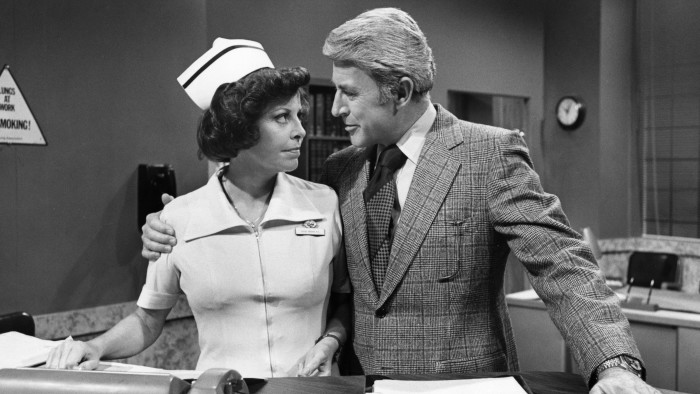Unlock the Editor’s Digest for free
Roula Khalaf, Editor of the FT, selects her favourite stories in this weekly newsletter.
The writer is a contributing columnist, based in Chicago
The US Midwest invented one of history’s most enduring art forms: the soap opera. They were created in the 1930s to sell soap to housewives, and I can still watch some of the same shows today that captivated my mother and grandmother in the 1960s. Millions enjoy the steamy daytime melodramas, and this year saw the premier of Beyond the Gates, the first new soap in the US in more than 25 years.
Back in the 1960s, my mother and I tuned in every weekday afternoon to General Hospital, Guiding Light and As the World Turns, on a black and white TV in our suburban Detroit basement. She ironed, while I hemmed bell-bottoms and smock tops — and together we spent more time watching “our” soaps than socialising with relatives or extended family.
Soaps are at the core of my beloved lowbrow Midwest cultural inheritance — right up there with demolition derbies, cruising the strip and visits to one of America’s first McDonald’s franchises. Barbara Irwin, soap opera expert and professor emerita at Canisius University, tells me they tap into an ancient hunger: “They hearken back to Scheherazade and the One Thousand and One Nights, or the serialised novels of Charles Dickens . . . continuing stories that leave a cliffhanger every day,” and often follow the same families for generations, she says. “That gives the audience an opportunity to really connect with the characters.”
The shows played a pioneering role socially, too. “The soaps addressed social issues in a groundbreaking way,” Elana Levine, a media expert at the University of Wisconsin-Milwaukee, told me. Cancer made its debut on US TV in 1962 in a soap opera, she says.
Guiding Light (which my mother listened to with her mother on the radio in the 1940s, before we watched it on TV) gave matriarch Bert Bauer uterine cancer. “The show got letters afterward from women saying ‘you saved my life’,” by educating them about early cancer detection, Levine says. Soaps were often the first to broach topics like Aids, drug addiction and gay marriage.
They certainly pass the test of time. General Hospital, 62 last month, has clocked up over 15,000 episodes — compared with under 250 even for a popular primetime show such as Friends. “Soap operas are getting close to 100 years [old],” Levine tells me, adding: “In the 1960s to 80s when they were at their most popular and profitable, they supported a lot of what the networks did in primetime.”
“Right now we are seeing an uptick of interest in soaps,” Irwin says. Beyond the Gates, about an affluent black family, launched in February by a partnership between the TV network CBS and the civil rights organisation NAACP, is already more popular than the talk show it replaced, she says.
Sure, they have been reduced from a peak of as many as 18 titles to just four (plus one former network show that is now only streaming) as alternative entertainment choices have exploded. But when I dropped in recently to catch up on 50 years of missed episodes of General Hospital, I found a lot that seemed familiar — like the improbable plot lines. The random episode I chose included a hospital assassination attempt, a newspaper expose of marital infidelity that involved the husband being drugged by a paid seductress, and a character switched at birth who joins a commune — all in an hour.
But I also found something new: a running screed of real-time social media reaction. As the show aired, I watched hundreds of comments fly by on X, many of them with animated gifs — and all of them passionate. “No Willow, it’s not all Drew’s fault if you lose your kids, it’s yours too!” This online fandom is a community that I wish my mother had in the 1960s: she enjoyed trash-talking the characters with me — but how much more fun would that have been on Facebook.
Despite Beyond the Gates, Irwin says she’s worried about the future of soaps. As titles and the audience shrink, the “generational passing down of soap viewing is dying away”. But even if soaps don’t make it to 100, the conventions they pioneered will live on. I don’t watch General Hospital with my daughter — but we catch Survivor every Wednesday night. Maybe that’s its own kind of inheritance.
